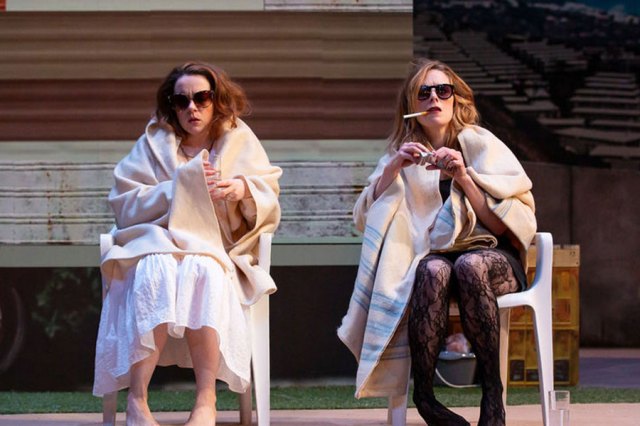
The title might invoke Chekhov, but David Greig’s new play for the Edinburgh Lyceum is set just across the Firth of Forth on the Fife coast. Amy and Emma, the two sisters, have gone for a break in Holiday Heaven, the caravan park where they used to go for summers with their parents. Emma is a successful lawyer and company director, who has hired a caravan to use as a writing retreat while she works on her first novel. Amy, wilder and less settled, has gatecrashed Emma’s retreat to escape a nasty patch in her marriage.
Holiday Heaven contains caravans with names like Paradise, Nirvana and Valhalla. Everything suggests that the sisters should be in for a wonderful time, and they even meet a throwback from their teenage years; Lance, the camp caretaker, a vinyl-loving hippy in board shorts who had been the DJ all those years ago and is still doing the same job.
On one level, the play is an exploration of memory and the distorting effects of time. The backdrops of Wils Wilson’s production are peeling and tattered, and Lisbeth Burian’s sets are rusty and decayed. The characters spend a lot of their time looking back on their past lives, and all three of them have faulty memories, or things that they’ve completely forgotten. The audience is even invited to participate in the process by answering some questions about their own past, with some of the answers being read out on stage.
It’s a nice idea, but its execution is severely hampered by Greig’s script, which lurches frequently from the believable to the artificial. Sometimes the characters sit around and chat as naturally as though they’re shooting the breeze, but at others the dialogue lurches into weirdly affected observations that are both jarring and incongruous. In the opening scene, for example, Amy has a very stagey sequence about how sex makes her connect with the universe, and bemoans the fact that her life is one big cliché. Elsewhere the language veers off into extended metaphors about how love is like a supermarket aisle of orange juice, or compares the teenage heart to the Chernobyl reactor.
All this stops the characters from being believable, especially the two women, who do it the most. It also means that Greig draws attention to his themes as though underlining them, and that sucks the drama from many of the situations. Sometimes it feels more like listening to a philosophical discourse or an essay than a play, and that contributes to the excessive running time, clocking in at an unnecessarily baggy three hours. Furthermore, I didn’t buy the adult romance plotline, or the bizarre turn with a gun that makes it reach its conclusion.
Clunky devices like that aren’t the mark of a storyteller at the top of his game, and it’s made worse by the decision to deploy a chorus of about a dozen teenagers. It’s an odd structural device that again draws attention to the play’s artificiality, and their occasional contributions feel more like an interruption than a revelation. It’s hard to see how they bring anything that couldn’t have been achieved by some more smartly written dialogue.
The main reason it’s watchable is the performances of the three leads. Jess Hardwick and Shauna Macdonald bring the sisters to life with energy, and they manage to show both how different the sisters are and how fundamentally similar. Erik Olsson is likeable as Lance, who never grew up and who makes his way through life with simplicity and ease.
Overall, though, Two Sisters is a disappointment. Even though he has been artistic director of the Lyceum since 2015, this is Greig’s first original work that he has staged in his tenure. I wish he’d picked something with more focus.
















